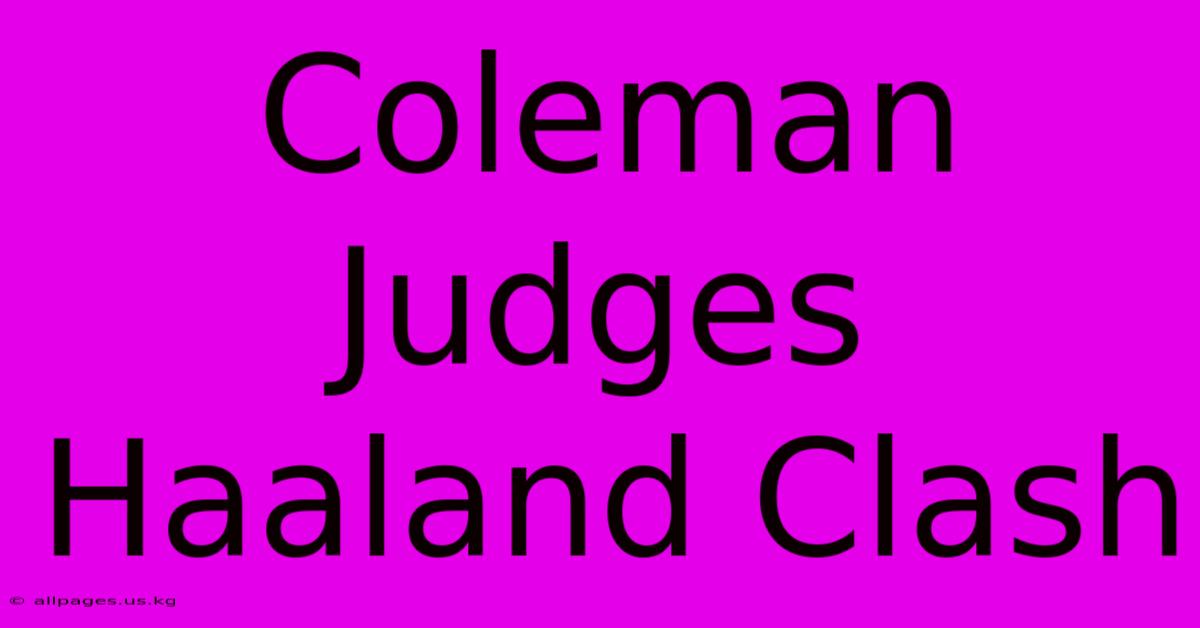Coleman Judges Haaland Clash

Discover more detailed and exciting information on our website. Click the link below to start your adventure: Visit Best Website allpages.us.kg. Don't miss out!
Table of Contents
Coleman Judges Haaland Clash: A Deep Dive into the Controversy
The recent clash between Representative Marjorie Taylor Greene and Interior Secretary Deb Haaland has ignited a firestorm of controversy, highlighting deep divides within the American political landscape. This article delves into the specifics of the conflict, examining its underlying causes and potential ramifications.
Understanding the Roots of the Conflict
The conflict stems from differing ideologies and approaches to land management and resource allocation. Representative Greene, a Republican known for her conservative views, frequently criticizes the Biden administration's environmental policies. Secretary Haaland, a Democrat and the first Native American to serve as a cabinet secretary, champions environmental protection and tribal sovereignty.
Haaland's Policies: A Focus on Conservation and Tribal Rights
Secretary Haaland's tenure has been marked by a strong emphasis on conservation and the recognition of Native American rights related to land use. This includes initiatives aimed at protecting endangered species, preserving natural resources, and restoring tribal lands. These policies, while praised by environmental groups and many Native American communities, have drawn significant criticism from some Republicans who view them as overly restrictive and detrimental to economic development.
Greene's Criticism: Accusations of Overreach and Mismanagement
Representative Greene has been a vocal critic of Haaland's policies, accusing her of mismanagement and overreach. Greene's criticisms often center on the perceived economic impact of these policies on various industries, particularly those reliant on natural resource extraction. She has also voiced concerns about the potential impact on individual property rights.
The Public Clash and its Fallout
The public clash between Greene and Haaland wasn't a single event, but rather a series of escalating criticisms and confrontations. These interactions have often played out on social media and during congressional hearings, fueling the public debate and further polarizing opinions.
Specific Examples of the Clash
One key area of contention involved [insert specific policy or event here – e.g., a particular land-use decision, a budget allocation, a public statement]. Greene's response to this was [explain Greene’s reaction], while Haaland’s response was [explain Haaland’s reaction]. This exchange exemplifies the broader conflict between their differing philosophies. Another example could be [insert another specific instance of clash, with details].
The Role of Social Media in Amplifying the Conflict
The use of social media by both Greene and Haaland, and their supporters, has undoubtedly amplified the conflict. Social media platforms have become battlegrounds for political discourse, and this particular clash has been no exception. The rapid spread of often-polarized opinions online has contributed to the intense public debate.
Implications and Future Prospects
The ongoing conflict between Greene and Haaland is more than just a personal feud; it represents a broader struggle over the future direction of American environmental and land-use policy. The outcome will likely shape how these crucial issues are addressed for years to come.
Potential Impacts on Environmental Policy
The clash highlights the deep partisan divisions surrounding environmental issues. This polarization makes it challenging to find common ground and enact effective, bipartisan legislation. The long-term impact on environmental protection efforts remains uncertain.
The Future of Tribal Relations
The conflict also touches upon the sensitive issue of tribal sovereignty and the relationship between the federal government and Native American communities. Haaland's advocacy for tribal rights could face continued challenges from those who oppose her policies.
Calls for Compromise and Dialogue
Despite the intense polarization, some voices are calling for compromise and constructive dialogue. Finding common ground on such critical issues is essential for effective governance and ensuring a sustainable future for all Americans.
Keywords: Coleman, Judges, Haaland, Clash, Marjorie Taylor Greene, Deb Haaland, environmental policy, land management, tribal sovereignty, conservation, political conflict, Biden administration, Republican, Democrat, social media, political polarization, American politics, resource allocation.

Thank you for visiting our website wich cover about Coleman Judges Haaland Clash. We hope the information provided has been useful to you. Feel free to contact us if you have any questions or need further assistance. See you next time and dont miss to bookmark.
Featured Posts
-
Stuff Your Kindle Day Free Book Deals
Dec 27, 2024
-
Live Score Rutgers Vs Kansas State Game
Dec 27, 2024
-
Moderate Boxing Day Sales Crowds
Dec 27, 2024
-
Can Liverpool Win The League
Dec 27, 2024
-
Locketts Catch Smiths 15 Yard Throw
Dec 27, 2024
